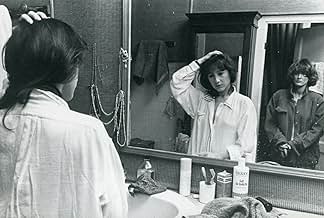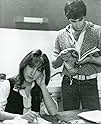Une semaine de vacances
- 1980
- Tous publics
- 1h 42min
NOTE IMDb
6,6/10
806
MA NOTE
Laurence, une jeune institutrice lyonnaise, prend un congé d'une semaine. Pendant ces vacances, elle réfléchit à sa carrière et à sa vie personnelle.Laurence, une jeune institutrice lyonnaise, prend un congé d'une semaine. Pendant ces vacances, elle réfléchit à sa carrière et à sa vie personnelle.Laurence, une jeune institutrice lyonnaise, prend un congé d'une semaine. Pendant ces vacances, elle réfléchit à sa carrière et à sa vie personnelle.
- Réalisation
- Scénario
- Casting principal
- Récompenses
- 3 nominations au total
Catherine Anne Duperray
- Josiane Lalande, le professeur chahuté
- (as Catherine-Anne Duperray)
Nicole Biondi
- La mère de Claudine
- (non crédité)
Silvia Jouve
- La petite fille
- (non crédité)
Avis à la une
Although my memory is somewhat hazy (I saw this movie 17 years ago.), the concept of being stuck in a rut caught my attention. When the heroine takes her vacation, it is not just from work but from her personal life as well. I remember thinking about how her self-assessment would not have been as effective had she maintained her personal contacts during that time.
Today, I'm not an "expert" of the work of Mr. Bertrand Tavernier. But this movie gave me a great desire to be more interested in his work.
It's a very good film about the questions, doubts, fears, anxieties that adults can feel socially and in particular through the role of Miss Laurence Cuers (Nathalie Baye), young teachers. Besides this social and depressive anxiety feeling that emerges, the film criticizes the French National Education, which thirty years later, has the same fundamental flaws by the national education process itself and even the general contemporary cultural environment, which on this point, if I allow myself, get worse.
A beautiful story and a great accomplishment captivate us throughout the film, helped by a distribution well served by Nathalie Baye and Gerard Lanvin and energized by Michel Galabru and Philippe Noiret. And the action take place in Lyon (France) is often nice to see another town than Paris in the French cinema.
A good film very interesting and rewarding.
jelios
jelios@hotmail.fr
It's a very good film about the questions, doubts, fears, anxieties that adults can feel socially and in particular through the role of Miss Laurence Cuers (Nathalie Baye), young teachers. Besides this social and depressive anxiety feeling that emerges, the film criticizes the French National Education, which thirty years later, has the same fundamental flaws by the national education process itself and even the general contemporary cultural environment, which on this point, if I allow myself, get worse.
A beautiful story and a great accomplishment captivate us throughout the film, helped by a distribution well served by Nathalie Baye and Gerard Lanvin and energized by Michel Galabru and Philippe Noiret. And the action take place in Lyon (France) is often nice to see another town than Paris in the French cinema.
A good film very interesting and rewarding.
jelios
jelios@hotmail.fr
I have my own take on this masterpiece by the great Bertrand Tavernier and that is to listen; to listen to others and to oneself. Talk to others, but listen to others. Laurence played by Nathalie Baye ( who is one of France's finest actors ) is a schoolteacher and she is having a breakdown. She either has to stay in her profession, stay with her lover who adores her or move on. Is moving on the answer or staying still ? By talking to others she spends her time out from school and tries to make a decision. She listens to the problems of those around her and she is a child again in the classroom of life, and painfully and slowly she learns what a sublime horror it is to be human.
This film is a masterpiece because it explores both on a personal level and on a societal level. We all have problems of ageing, loving and eventually dying in a world that seems to make of us just a number. A song of the day, about being just a number plays more than once and Tavernier shows with intelligent persuasion that a pop song and a bad television programme can also help us understand life and to live. There is a wonderful kick at Opera in the film that had me cheering. Most need the smallest and most popular things to survive. That includes dialogue, which the film is full of and through dialogue with others we just may be strong enough to continue, to cohabit with an unjust world and to grow into just being ourselves. The scenario is full of working people, and not the luxury class of those who can afford not to care or who just feed off others without giving. A lot of cinema depicts these people but in this film they are not there. True life is richer than the laziness and opportunism of the rich.
I am astonished this film has only 4 reviews. People not wanting to listen perhaps ? Forty years on and in desperate times this film has perhaps greater relevance than in 1980 and a big thank you for Tavernier, Baye and all of the other actors for making this essential film what it is. It maybe ' old ' to some, but looks as fresh to me as its first outing in the cinema.
Laurence (Nathalie Baye), thirty one years old, is a high school French teacher in Lyon. She has a good relation with her students, genuinely cares for them and they appreciate her efforts. She is reasonably attractive, charismatic and socially adept with neighbors and colleagues (one of them, a woman endowed with a oversized sense of humor is her best friend). She gets along well with her parents, which are aging in apparent harmony in a small village nearby and even with her ne'er-do-well brother Jacques. Her boyfriend Pierre is at times overbearing and unsubtle, but sincerely loves her and dreams of having a child with her. At times, he seems to know her better than she herself does. Her friend urges her to formalize her relationship with Pierre and start a family before her biological clock winds down.
All of this changes one morning, when Laurence has a near panic attack, is unable to face her class and misses school. She is given a week's vacation to sort out her (unexplained) problems. She reexamines her life in a new and rather negative light; in spite of her efforts her student's writing is full of cliches and platitudes, a neighbor responds improperly to her kindness and she tries clumsily to find a pretext to break up with Pierre. At this point, order and purpose disappear and we are faced with the chaos of real life; motivations are unclear or missing, actions have unexpected reactions and plans seem not to work any longer. Whether Laurence will strike a new path or go back to her previous life after the week's vacation is left open.
The movie rests squarely on Baye's shoulders; she is in almost every scene. She does an excellent job. The other actors are at the same level, among them Tavernier regular Philippe Noiret in a short role. The script is spare and (as the movie requires) does not attempt to weave a conventional plot. A successful movie.
All of this changes one morning, when Laurence has a near panic attack, is unable to face her class and misses school. She is given a week's vacation to sort out her (unexplained) problems. She reexamines her life in a new and rather negative light; in spite of her efforts her student's writing is full of cliches and platitudes, a neighbor responds improperly to her kindness and she tries clumsily to find a pretext to break up with Pierre. At this point, order and purpose disappear and we are faced with the chaos of real life; motivations are unclear or missing, actions have unexpected reactions and plans seem not to work any longer. Whether Laurence will strike a new path or go back to her previous life after the week's vacation is left open.
The movie rests squarely on Baye's shoulders; she is in almost every scene. She does an excellent job. The other actors are at the same level, among them Tavernier regular Philippe Noiret in a short role. The script is spare and (as the movie requires) does not attempt to weave a conventional plot. A successful movie.
For me, Bertrand Tavernier is the greatest French cinema director of the last 30 years. His films always have that real great sense of reality. It's also got creativity and intelligence. As I was watching fragile Nathalie Baye in this film, I was thinking what Hollywood would have done with that kind of story. The teacher will have face adversity and
realise that her duty is to carry on, even if she's not made for this work. It will have violons and tears. Here, Nathalie Baye said no to all that, and we are very happy for her. For 1 hours 45 minutes, Tavernier makes us know the deep feelings of that woman. The logic says she will quit. And so she does and we're happy. Watch good work from veteran comic Michel Galabru, in a serious part.
realise that her duty is to carry on, even if she's not made for this work. It will have violons and tears. Here, Nathalie Baye said no to all that, and we are very happy for her. For 1 hours 45 minutes, Tavernier makes us know the deep feelings of that woman. The logic says she will quit. And so she does and we're happy. Watch good work from veteran comic Michel Galabru, in a serious part.
Le saviez-vous
- AnecdotesPhilippe Noiret makes an appearance, reprising his same role of Michel Descombes from "L'Horloger de Saint-Paul"(1974). Both films take place in Lyon.
- Crédits fousto Jean Aurenche
Meilleurs choix
Connectez-vous pour évaluer et suivre la liste de favoris afin de recevoir des recommandations personnalisées
- How long is A Week's Vacation?Alimenté par Alexa
Détails
- Date de sortie
- Pays d’origine
- Langue
- Aussi connu sous le nom de
- A Week's Vacation
- Lieux de tournage
- Lycée Edouard-Herriot, Place Edgar Quinet, Lyon, Rhône, Rhône-Alpes, France(exteriors: school)
- Sociétés de production
- Voir plus de crédits d'entreprise sur IMDbPro
- Durée
- 1h 42min(102 min)
- Mixage
- Rapport de forme
- 2.35 : 1
Contribuer à cette page
Suggérer une modification ou ajouter du contenu manquant


























